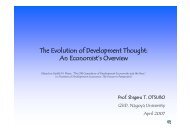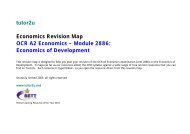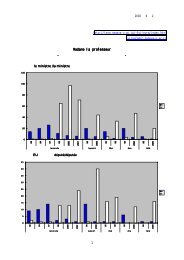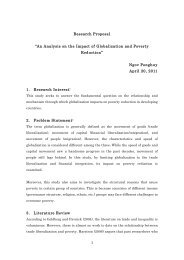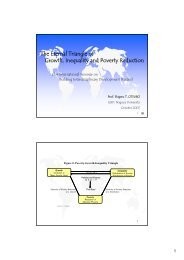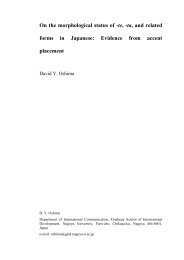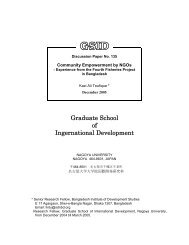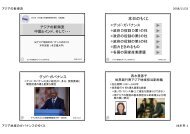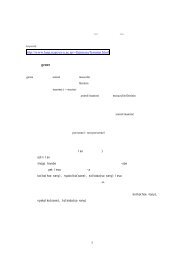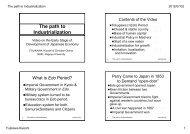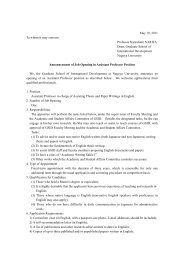Report
Report
Report
You also want an ePaper? Increase the reach of your titles
YUMPU automatically turns print PDFs into web optimized ePapers that Google loves.
156 QUANTIFICATION OF BENEFITS FROM ECONOMIC COOPERATION IN SOUTH ASIA<br />
Dentists: Under the Dental Council of India Act, the<br />
Dental Council of India may enter into negotiations<br />
with the relevant authority of the foreign country and<br />
set up a scheme of reciprocity for recognition of dental<br />
qualifications. The Council reportedly has reciprocal<br />
agreements with UK, Australia and New Zealand. 30<br />
Agreements on a reciprocal basis with SAARC countries<br />
are also a possibility under this provision.<br />
The Dental Council of India Act also envisages<br />
temporary registration of foreign qualified doctors who<br />
are engaged in teaching or research in India. 31<br />
Degrees obtained by Indian citizens from certain<br />
foreign countries are also specified as recognised degrees<br />
by virtue of which such person can register as a dentist<br />
with the dental council. However a foreign dentist<br />
holding a similar degree cannot register. For a foreign<br />
degree to be recognised, therefore, an arrangement of<br />
reciprocity with such country is a pre-requisite.<br />
Nursing: The Indian Nursing Act provides for three<br />
categories of nursing professionals based on<br />
qualifications and training: Nursing, Midwives and<br />
Auxiliary Nurse Midwives. Only nurses registered with<br />
the Indian Nursing Council can practice the profession<br />
in India. The Nursing Council has the power to<br />
recognise qualifications from other countries. However,<br />
it is not clear whether nursing degrees from other<br />
SAARC countries are recognised in India. India<br />
reportedly has arrangements recognising degrees from<br />
the USA and Canada. 32<br />
The Maldives 33<br />
FDI-related Requirements<br />
Foreign investment in the Maldives is governed by Law<br />
25/79. The law provides the framework for an agreement<br />
between the government and a foreign investor.<br />
This law was reportedly passed in 1972, and the<br />
government is in the process of amending and replacing<br />
it with an updated law. The law does not specify any<br />
sector specific limits to foreign direct investment. It<br />
simply provides for the procedure for a foreign investor<br />
to enter into an agreement with the government of<br />
Maldives to invest into the country. In practice, for most<br />
sectors, with the exception of retain and education, the<br />
Government allows for 100% foreign investment.<br />
The basic stages for investment into the health<br />
sector would involve the following 34 :<br />
• An application regarding the proposed investment<br />
needs to be made to the Foreign Investment Services<br />
Bureau (FISB), which is part of the Ministry of<br />
Trade, Industries and Labour<br />
• The FISB’s Evaluation Committee reviews the<br />
proposal primarily from the point of view of infrastructure<br />
availability and consumer needs. There<br />
are no sector-specific guidelines for this; the<br />
approach adopted is a case-by-case approach.<br />
• 100% FDI is normally allowed in the event the<br />
proposed investment is worth US$ 1 million or<br />
above. For investments lesser than US$ 1 million,<br />
joint ventures with a local partner are recommended.<br />
• A decision is typically reached by the FISB within<br />
3–4 weeks of the proposal being made.<br />
• Once investment is authorised for setting up of a<br />
hospital or a health centre, registration of the same<br />
with the Ministry of Health is also necessary.<br />
Domestic regulations regarding qualification and<br />
licensing criteria for medical practioners and<br />
dentists and nurses<br />
Rules, regulations and guidelines enacted by the<br />
ministry of health govern the qualification and licensing<br />
criteria for medical practitioners, dentists, nurses and<br />
paramedics. 35 The government of Maldives typically<br />
advertises internationally for skilled medical practitioners,<br />
and it has been estimated that approximately<br />
75% of medical practitioners in the Maldives, including<br />
doctors, dentists, other specialists, nurses and<br />
paramedics are of foreign origin. 36 It has also been<br />
estimated that the proportion of Indians among the<br />
foreign doctors in the Maldives, is close to 70%. 37<br />
30<br />
Section 34, Dental Council of India Act, 1948<br />
31<br />
Ibid.<br />
32<br />
See, http://www.anmc.org.au/international/index.php<br />
33<br />
Information in this section on Maldives has been obtained from a review of Law 25/79 on Foreign Investments, and discussions<br />
with Mr. Ahmad Shahid, First Secretary (Economic and Commercial), High Commission of Maldives, New Delhi.<br />
34<br />
Ibid.<br />
35<br />
Copies of regulations could not be obtained. This section however summarises the overview provided by Mr. Ahmad Shahid,<br />
First Secretary (Economic and Commercial), High Commission of Maldives, New Delhi.<br />
36<br />
Discussions with Mr. Ahmad Shahid, First Secretary (Economic and Commercial), High Commission of Maldives, New Delhi.<br />
37<br />
Ibid.




